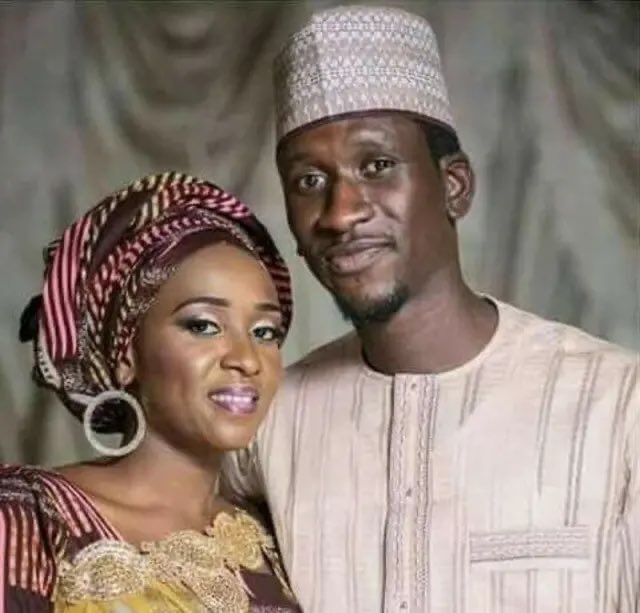
BREAKING NEWS: President Tinubu Removes Maryam Sanda from Presidential Pardon List in Major Crackdown on Convicted Offenders

In a dramatic and decisive move that has sent ripples across Nigeria’s political and legal landscape, President Bola Ahmed Tinubu has reportedly ordered the immediate removal of Maryam Sanda, the woman sentenced to death in 2020 for the murder of her husband, Bilyaminu Bello, from the federal pardon list. This decision marks a significant turn in the administration’s stance on issues of justice, accountability, and the sanctity of human life, signaling what many analysts describe as a “new era of zero tolerance” for violent and capital crimes in Nigeria.
According to credible sources within the Presidency, the directive was part of a broader review of the national pardon list, which had earlier included names of individuals convicted for various serious crimes ranging from homicide to drug trafficking, kidnapping, human trafficking, fraud, and illegal arms possession. The move is said to be part of Tinubu’s ongoing effort to sanitize the justice system and restore public confidence in the rule of law—an area many Nigerians have long accused the political class of manipulating for personal and political gain.
Maryam Sanda’s case remains one of the most sensational and emotionally charged criminal cases in recent Nigerian history. In November 2017, she was accused of stabbing her husband, Bilyaminu Bello, the son of a former PDP chairman, to death in their Abuja home after a heated argument allegedly fueled by jealousy and domestic disputes. The story captured nationwide attention, sparking fierce debates about domestic violence, gender dynamics, and justice in high-profile cases. After a lengthy legal process, she was sentenced to death by hanging by the Federal Capital Territory High Court in Abuja in January 2020—a verdict upheld by the Court of Appeal in 2022.
Since her conviction, reports of her inclusion in a presidential pardon list had been a point of public outrage and legal controversy. Many Nigerians saw it as another example of how the privileged often manipulate the system to escape justice. But President Tinubu’s recent action appears to have directly addressed that concern. By specifically ordering that individuals convicted of capital or severe offenses be struck off any existing or proposed pardon lists, the President has drawn a clear line that certain crimes, especially those that involve the taking of human life, will not be excused under his administration.
A senior government official who spoke on condition of anonymity confirmed the President’s order, saying, “The President has reviewed the previous list of pardons and commutations. He has made it clear that persons convicted of heinous crimes, including murder, kidnapping, trafficking, and drug offenses, are not to benefit from such acts of clemency. The focus is on justice and maintaining public trust in the legal system.”
In addition to removing those convicted of violent and grave crimes, the new directive reportedly mandates that even those previously granted partial pardons or sentence reductions be reviewed. Tinubu’s administration, sources say, aims to ensure that only individuals convicted of lesser, non-violent offenses—especially those who have demonstrated genuine rehabilitation and remorse—are considered for mercy.
Public reactions have been swift and largely supportive. On social media, Nigerians have praised the move as a necessary correction and a sign of responsible leadership. Hashtags like #JusticeForBilyaminu and #TinubuActs trended on X (formerly Twitter), with users commending the President for what many describe as “a bold stand against selective justice.” One user wrote, “This is what we’ve been asking for—justice that doesn’t discriminate between the rich and poor. Every life matters.” Another added, “Maryam Sanda’s removal from the pardon list restores hope that the rule of law still means something in this country.”
Legal analysts have also weighed in, describing Tinubu’s directive as both constitutional and morally justified. According to constitutional lawyer Barrister Olumide Adekoya, “The President’s power to grant or withdraw pardons is absolute under Section 175 of the Nigerian Constitution. However, it must be exercised with caution and in the best interest of justice. In this case, removing individuals convicted of severe crimes from the pardon list reinforces the principle that justice should not be compromised for political convenience.”
However, not everyone has applauded the move. Some human rights advocates argue that while justice must be served, the process should still consider the conditions of confinement and the broader context of Nigeria’s penal system. “Justice should not mean vengeance,” said activist Hauwa Ibrahim. “Yes, murder is a grave crime, but every convict also has the right to appeal, reform, and redemption. What we need is consistency and fairness in applying justice, not selective rigidity.”
Despite these concerns, the overall mood across the country reflects approval and relief. For many Nigerians who had viewed the previous administration’s handling of clemency with skepticism, Tinubu’s order is being interpreted as a welcome effort to restore moral clarity and discipline to governance. It is also being seen as part of a larger anti-corruption and accountability agenda—one that sends a clear message that influence and wealth can no longer shield anyone from the consequences of their actions.
Political commentators have noted that this move could also have far-reaching implications for the country’s justice system. It may prompt a re-examination of the criteria used to select individuals for pardon, as well as spark renewed discussions about prison reforms, judicial independence, and the rights of victims’ families. There is also growing speculation that Tinubu’s decision may influence how future cases of domestic violence and homicide are prosecuted, particularly in high-profile situations where the accused wield social or political power.
Meanwhile, the family of the late Bilyaminu Bello is said to have received the news with quiet satisfaction. While no official statement has been released by them, close associates report that the family views the development as a long-overdue vindication of their loss and a confirmation that justice has not been forgotten.
As the story continues to unfold, one thing is clear—President Tinubu’s decision has reignited national conversations about justice, equality, and leadership. For a nation that has long battled with perceptions of double standards in the legal system, this move could mark a turning point. It stands as both a political statement and a moral declaration that Nigeria under Tinubu will not tolerate impunity, no matter how high the stakes or powerful the individual involved.
Whether this bold stance will set a new precedent or remain a symbolic act will depend on how consistently it is enforced going forward. But for now, Nigerians are watching—and for the first time in a long while, many are beginning to believe that justice might just be finding its way back to the center of power.


